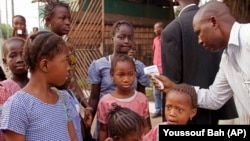The World Health Organization has approved the first Rapid Test Kit for use in Ebola affected countries in West Africa. WHO says the test will significantly speed up the process of ferreting out people who have become infected with the deadly Ebola virus.
WHO calls this new Antigen Rapid Test a breakthrough in efforts to detect the Ebola virus, which has infected more than 23,200 people and killed 9,365 in Liberia, Sierra Leone, and Guinea over the past year.
Spokesman Tarik Jasarevic tells VOA the test is not perfect, but good enough to make a significant difference.
“The test can correctly identify 92 percent of Ebola-infected patients and 85 [percent] of those not infected with the virus. So, it is again less accurate, but the advantages outweigh the risks,” he said.
Results in 15 minutes
Jasarevic says the rapid test should later be confirmed by the standard laboratory test that detects the virus’s nucleic acid or genetic material. He says it is more accurate, but also more complex to use. He says these so-called PCR tests are performed in well-established laboratories and require fully trained personnel to administer them.
In addition, Jasarevic notes it takes between 12 and 24 hours to get results unlike the rapid test, which can give results in 15 minutes and is much easier to apply.
“It is easy to perform. It does not require electricity and it can be therefore used in lower health care facilities, lower level of health care facilities or in mobile units for patients in remote settings… And it does not require the highly trained personnel as for the other one,” he said.
The new rapid test was developed by the U.S.-based Corgenix Medical Corporation. The World Health Organization evaluated this diagnostic product under its Emergency Assessment and Use procedure, that seeks to provide minimum quality, safety and performance assurances.
Jasarevic says the cost of the product has not yet been set. He says Corgenix currently is finishing some administrative procedures with the U.S. Food and Drug Administration, which has approved the safety of the diagnostic test. He says this should be completed within the next two weeks.
After that, he says the test will be available for purchase. He says the group Doctors Without Borders has expressed interest in buying it.




